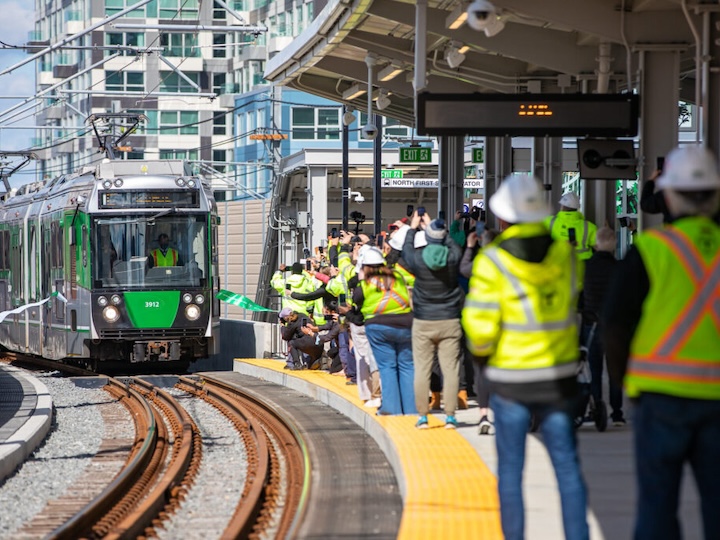“I am horrified by the MBTA’s lack of concern for public health in this area.” Cambridge residents decry planned heavy digging through asbestos and air out other concerns.
For public transit users around Greater Boston, the experience of riding the T has become somewhat less painful over the past few months. Extensive track work has led to the near-elimination of so-called slow zones, while other overdue restorations have also made for more comfortable rides.
Those improvements were on full display at this month’s meeting of the MBTA Board of Directors. But coupled with that glee was a reminder that the system’s problems extend beyond tracks and rail cars, and impact multiple communities.
As Cambridge resident Charles Teague explained ahead of Thursday’s meeting, he and other people who live near him planned to “voice concerns over multiple unnecessary and dangerous MBTA actions in the Alewife/North Cambridge area.” Those actions, all pertaining to a half-mile section of path “used by commuters, walkers, joggers, bikers, and dog walkers,” include: “constructing a repair access tunnel in an asbestos contaminated site,” “converting a park to a bike/electric vehicle expressway,” and “unnecessary and illegal tree clearance in Alewife Brook wetland.”
Teague said these questionable actions were initiated prior to the leadership of Phillip Eng, the current general manager and CEO of the MBTA. The Cambridge activist noted that while “Eng repeatedly recites that the MBTA needs to build trust to win back riders,” the issues his group is raising “involve sometimes secret, sometimes deceitful, and often disrespectful processes.”
“I am horrified by the MBTA’s lack of concern for public health in this area,” North Cambridge resident Alida Castillo testified. “This is not a month-long inconvenience, it is potentially permanent damage to residents’ lungs and health.”
The Alewife asbestos tunnel
According to Teague and others, far too much information about access tunnel site selection has been withheld from the public. That frightens them since the current plan is to remove about 20 tons of asbestos near Russell Field, where younger kids play soccer and baseball and high schoolers have football practice. They’re asking for the tunnel dig to be relocated to a “clean site” a quarter-mile away, which they contend “should also be far less costly and have less negative climate impact.”
Among their biggest gripes, speakers noted the apparent reluctance of the MBTA to follow a Cambridge Asbestos Protection Ordinance. “This site should have been disqualified immediately,” Teague said.
“If you’re going to risk exposing children, spectators … everyone else, you should at least be following the relevant ordinances,” resident Heather Hoffman said. Speaking to the MBTA board members, she added, “You guys have it within you to do this right—you shouldn’t have hidden it from the public for two years, with the connivance of the City of Cambridge as well.”
The next speaker piled on: “We are gravely concerned about the asbestos. … Our community feels very much besieged by all of these projects. We feel like the community is not being heard, and not being listened to. We very much want to be able to speak with you about the quality of life for these citizens.”
Overhauling the old Alewife Complex
A few years from now, the area around Alewife Station and the facility itself will look markedly different from the dated concrete structure and surrounding open space currently there. In August, the MBTA hosted a “joint development forum to explore the transformation of the Alewife Complex, one of Cambridge’s most vital transportation hubs, into a premier public transit and mixed-use development.” That includes a demolition and overhaul of the current Red Line and Commuter Rail station and 2,733-space parking garage.
“Mixed-use transit-oriented development opportunities like Alewife can really spur economic development in local communities, introduce more affordable housing, and assist the Commonwealth in its climate change goals,” Eng, the MBTA CEO, said in a statement. The announcement came with plans to move quickly, with the MBTA issuing “requests for proposals seeking developer qualifications by late summer 2024,” accepting applications through the fall, and selecting a development partner this winter.
But while Eng also pledged to “partner with the communities we serve to develop safe, walkable, interconnected public spaces focused around our stations,” and thanked the City of Cambridge for its “continued collaboration in this shared goal,” locals argue that the opposite is happening.

Linear Park and MBTA tree clearance
As Teague likes to remind people, in 1985, then-Gov. Michael Dukakis and other officials “dedicated Alewife Linear Park to be maintained by Cambridge and Somerville as a walkway for pedestrians and bicycles.” Now, the MBTA is about to approve Cambridge’s changing the park into a so-called expressway for everything from bikes to mopeds to electric scooters. Hoffman and others have repeatedly testified that this will compromise pedestrian safety.
And then there is the canopy. As Teague testified, the conversion of Linear Park “will likely mortally wound about 150 mature trees.” That’s in addition to about 70 trees the MBTA already chopped in the Alewife Brook wetland in May, possibly violating the state’s Wetlands Protection Act.
“Mature trees supply cooling to the neighborhood and require decades to replace,” Teague said. “As heat is the number one cause of weather-related deaths and given our ever-increasing heat waves, this is dangerous. … Tree loss doesn’t affect service, but it affects people, and your riders who can’t afford to take an air-conditioned Uber in the heat.”
T service is improving, but the flooding continues
Kristin Anderson of Save the Alewife Brook fought back tears explaining the hardships endured by her family and neighbors with the current situation created by prior development and an out-of-code outfall steps from the Alewife garage. She spoke of the brook banks flooding five times in a year, millions of gallons of untreated water streaming into the surrounding communities, and children playing in the sewage.
Echoing others, Anderson said the looming development will only worsen the flooding. “It is reasonable that the T works with the impacted communities to ensure that the benefits and burdens are shared equitably,” she added, joining the chorus in asking for new underground retention tanks and the formation of a community advisory board to monitor MBTA projects near Alewife.
After the testimonies, MBTA CEO Eng stepped up to present his general manager’s report. He thanked the Alewife contingent, and promised to have his team look into their concerns.
While recognizing that “there is still a lot of work to be done” across the system, Eng applauded how his agency has delivered “more trains” and “shorter trips,” among other improvements. He played a flashy highlight reel of T successes, and boasted that the agency has saved the average rider 88 minutes of travel time. Things, the Insta-ready clip promised, are only going to get better.
For people who live around Alewife Station, though, it’s hard to see the pretty picture through all of the sewage and asbestos.
This article is syndicated by the MassWire news service of the Boston Institute for Nonprofit Journalism. If you want to see more reporting like this, make a contribution at givetobinj.org.







